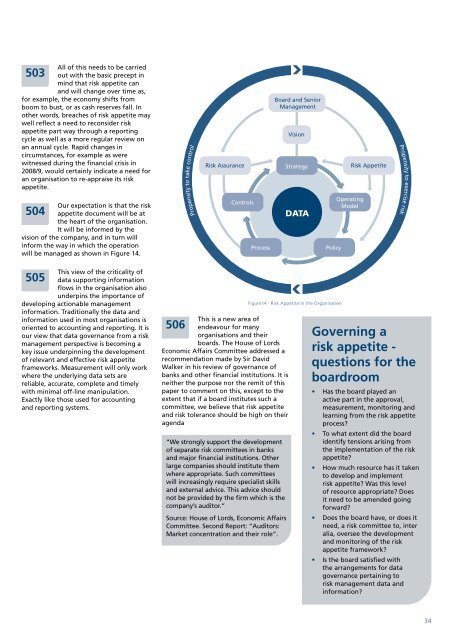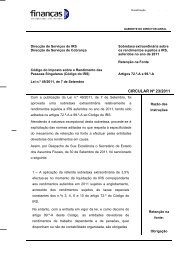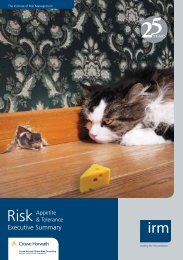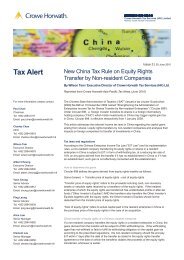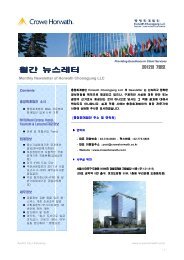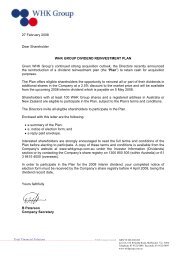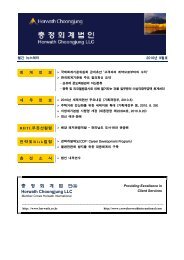Guidance Paper - The Institute of Risk Management
Guidance Paper - The Institute of Risk Management
Guidance Paper - The Institute of Risk Management
Create successful ePaper yourself
Turn your PDF publications into a flip-book with our unique Google optimized e-Paper software.
All <strong>of</strong> this needs to be carried<br />
503 out with the basic precept in<br />
mind that risk appetite can<br />
and will change over time as,<br />
for example, the economy shifts from<br />
boom to bust, or as cash reserves fall. In<br />
other words, breaches <strong>of</strong> risk appetite may<br />
well reflect a need to reconsider risk<br />
appetite part way through a reporting<br />
cycle as well as a more regular review on<br />
an annual cycle. Rapid changes in<br />
circumstances, for example as were<br />
witnessed during the financial crisis in<br />
2008/9, would certainly indicate a need for<br />
an organisation to re-appraise its risk<br />
appetite.<br />
Our expectation is that the risk<br />
504 appetite document will be at<br />
the heart <strong>of</strong> the organisation.<br />
It will be informed by the<br />
vision <strong>of</strong> the company, and in turn will<br />
inform the way in which the operation<br />
will be managed as shown in Figure 14.<br />
Propensity to take control<br />
<strong>Risk</strong> Assurance<br />
Controls<br />
Process<br />
Board and Senior<br />
<strong>Management</strong><br />
Vision<br />
Strategy<br />
DATA<br />
Policy<br />
Operating<br />
Model<br />
<strong>Risk</strong> Appetite<br />
Propensity to exercise risk<br />
This view <strong>of</strong> the criticality <strong>of</strong><br />
505 data supporting information<br />
flows in the organisation also<br />
underpins the importance <strong>of</strong><br />
developing actionable management<br />
information. Traditionally the data and<br />
information used in most organisations is<br />
oriented to accounting and reporting. It is<br />
our view that data governance from a risk<br />
management perspective is becoming a<br />
key issue underpinning the development<br />
<strong>of</strong> relevant and effective risk appetite<br />
frameworks. Measurement will only work<br />
where the underlying data sets are<br />
reliable, accurate, complete and timely<br />
with minimal <strong>of</strong>f-line manipulation.<br />
Exactly like those used for accounting<br />
and reporting systems.<br />
This is a new area <strong>of</strong><br />
506 endeavour for many<br />
organisations and their<br />
boards. <strong>The</strong> House <strong>of</strong> Lords<br />
Economic Affairs Committee addressed a<br />
recommendation made by Sir David<br />
Walker in his review <strong>of</strong> governance <strong>of</strong><br />
banks and other financial institutions. It is<br />
neither the purpose nor the remit <strong>of</strong> this<br />
paper to comment on this, except to the<br />
extent that if a board institutes such a<br />
committee, we believe that risk appetite<br />
and risk tolerance should be high on their<br />
agenda<br />
“We strongly support the development<br />
<strong>of</strong> separate risk committees in banks<br />
and major financial institutions. Other<br />
large companies should institute them<br />
where appropriate. Such committees<br />
will increasingly require specialist skills<br />
and external advice. This advice should<br />
not be provided by the firm which is the<br />
company’s auditor.”<br />
Source: House <strong>of</strong> Lords, Economic Affairs<br />
Committee. Second Report: “Auditors:<br />
Market concentration and their role”.<br />
Figure14 - <strong>Risk</strong> Appetite In the Organisation<br />
Governing a<br />
risk appetite -<br />
questions for the<br />
boardroom<br />
• Has the board played an<br />
active part in the approval,<br />
measurement, monitoring and<br />
learning from the risk appetite<br />
process<br />
• To what extent did the board<br />
identify tensions arising from<br />
the implementation <strong>of</strong> the risk<br />
appetite<br />
• How much resource has it taken<br />
to develop and implement<br />
risk appetite Was this level<br />
<strong>of</strong> resource appropriate Does<br />
it need to be amended going<br />
forward<br />
• Does the board have, or does it<br />
need, a risk committee to, inter<br />
alia, oversee the development<br />
and monitoring <strong>of</strong> the risk<br />
appetite framework<br />
• Is the board satisfied with<br />
the arrangements for data<br />
governance pertaining to<br />
risk management data and<br />
information<br />
34


